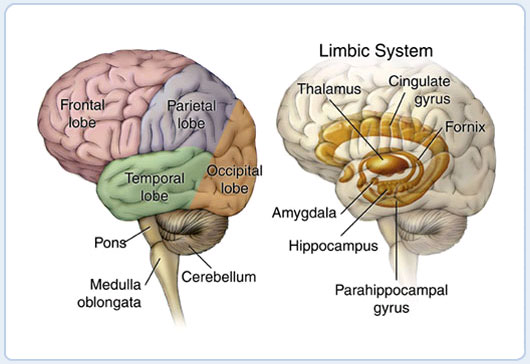
Emotions can have a large impact on our memories. The limbic system, which controls emotions and motivation, is also tightly connected with many other parts of the brain. More specifically, the hippocampus and the amygdala--parts of the limbic system--are particularly involved in emotions, and interestingly they are also very important in the formation of memories. Although there is much speculation, the underlying reason why emotions affect memories so profoundly has not yet been completely resolved.
It has been found that emotions affect the memory system by helping memories become more strongly encoded; this is due to the engagement of the amygdala. This stronger encoding can also be explained by the interactions between the emotional and memory areas of the brain. Research as found that they interact rather systematically and consistently during formation of emotionally-charged memories. Researchers speculate that this is because regions that are activated in the encoding of emotionally-charged memories are also involved when someone processes the meaning of images. However, when one looks at emotionally-neutral situations, the parts of the brain that handle perceptual processing are used.
The different types of emotions (positive or negative) also contribute to what kind of memories are formed. When people experience positive emotional situations, they remember the situation with a broader viewpoint and remember more central details. Those that experience negatively-charged situation tend to narrow their attention, and thus encode a more focused memory, and remember more peripheral details.
However, while emotional memories are more strongly encoded, they are more susceptible to the encoding of wrong information, which leads to forming false memories. This is especially true when someone experiences negative emotional content. Research has shown that when someone experiences a situation with a negative-emotional charge, they are more susceptible to forming false memories. Interestingly, this research has also found that adults are more likely than children to form false memories when faced with a negative emotional situation. Researchers hypothesize that this is due to the reliance of different brain structures--adults rely on "the meaning of what happened" while children rely more on "what actually happened". This research, however, did not address false memories associated with misleading. More research has found that when someone experiences a negative emotionally charged situation, and then given misleading (or leading) questions, they are more susceptible to forming false memories. Even those who experience a positive emotionally charged situation are vulnerable to the creation of false memories when asked misleading questions.

The seeming contradiction, that these memories are more strongly encoded, yet more susceptible to false information can be explained through hormones. When people experience stress, adrenaline is released, which helps in the encoding of information. However, long periods of stress lead to the secretion of glucocorticoids, which in high doses can harm the hippocampus. Those who experience Post Traumatic Stress Disorder have been found to have a smaller hippocampus, and it has been suggested that when people have emotional memories that cannot be controlled, it may be due to the reduction in the hippocampus's size.
1. Memory. This gives a good overview of how the human memory system works in general.
2. The Limbic System. This video gives a good breakdown of the parts of the limbic system in the brain.
3. Parts of the Amygdala. This video gives a good break down of the different structures of the amygdala, and their functions.
4. Reliability of Memories. This article gives an insight into the affects of negative emotion on memories.
5. Emotional Modulation. This article explains how emotions modulate the formation of memories.
6. False Memories. This article explains how different emotions lead to the formation of different memories and/or false memories.
7. Stress and Your Brain. This article gives a more in depth explanation of the affects of the size of the hippocampus on PSTD.
8. Strengthening Your Memories. This article gives further details on why hormones associated with emotions strengthen memories.
9. Emotional Memory. This research article goes into more detail on how emotional words affect memories.
10. Misleading Information. This research article goes into detail on how emotions and misleading information can affect the formation of false memories.
***This page was created and written by Leanne Holt. To my knowledge, all images used are not under copyright. If they have been used inappropriately, please contact me at leanne.m.holt@live.mercer.edu***
Comments (0)
You don't have permission to comment on this page.